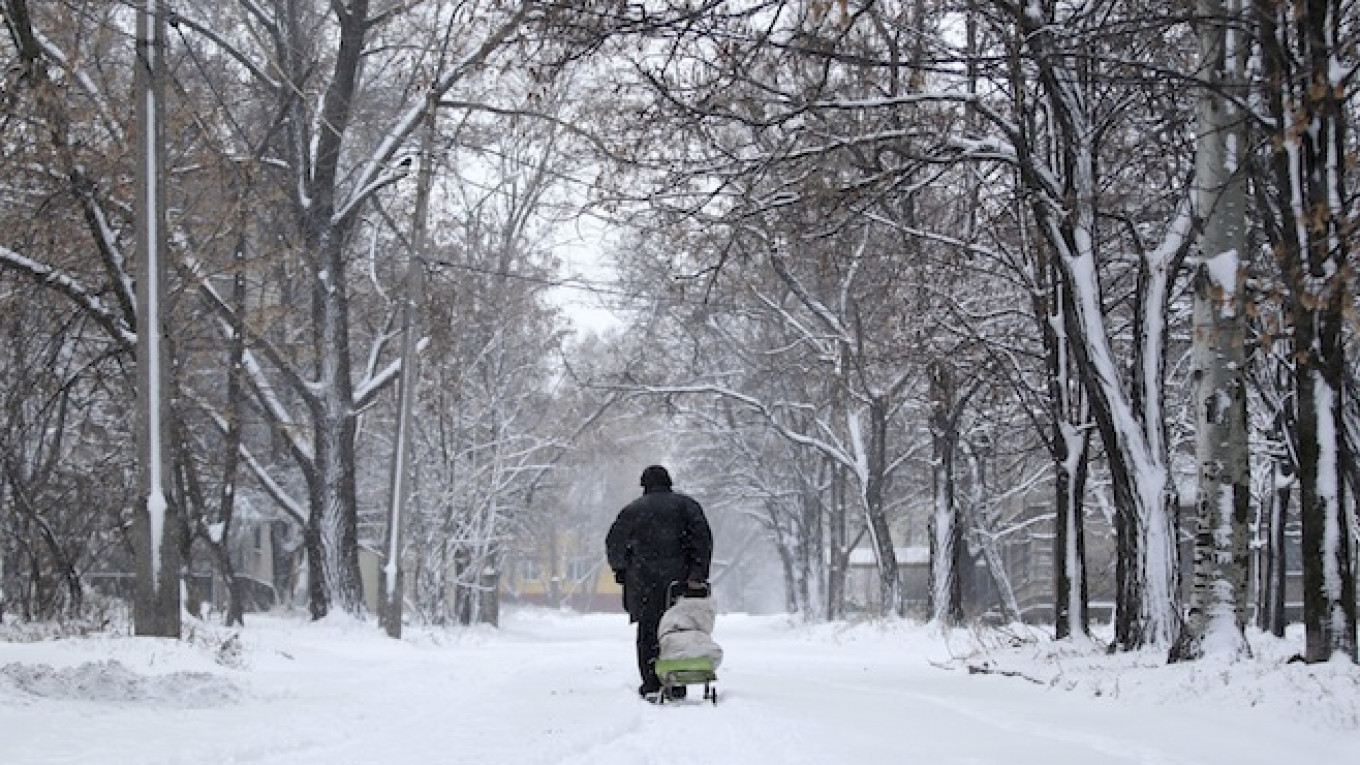"Winter is coming." The words of doom from the hit TV series "Game of Thrones" spell as much danger for war-torn eastern Ukraine as they do for the fictional land of Westeros, according to a senior official at the International Committee of the Red Cross (ICRC).
People in Ukraine's Donetsk and Luhansk regions lack the basic necessities to get them through the cold season, said Pascal Cuttat, a Swiss national who heads the ICRC regional delegation in Moscow.
"They lack the basic necessities — tap water, power, heating, hygiene items," he told The Moscow Times in an exclusive interview.
The ICRC, along with the local Red Cross branches, has helped 10,000 people in the area and 40,000 displaced in Crimea. Another 13,000 displaced in southern Russia and Belarus will receive ICRC assistance in the near future, Cuttat said.
But this is nowhere near sufficient: United Nations figures from mid-December put the number of internally displaced Ukrainians at 540,000, with another 560,000 refugees having left the country.
A pro-Russian insurgency controls a part of the Donetsk and Luhansk regions, including several big cities with a combined prewar population of about 1.8 million.
But the motley crews of rebels have so far struggled to organize a functioning government and pay pensions or salaries — so much so that famine looms.
More than 20 people have starved to death in the separatist-held zones so far, former rebel commander Igor Strelkov claimed in an article for the Novorossia news agency in December.
Relief efforts remain ongoing: Aside from the Red Cross, Russia has mounted 10 humanitarian convoys, and pro-Kiev Donetsk tycoon Rinat Akhmetov has also been sending aid.
But those efforts are mired in controversy: Pro-Kiev volunteer fighters, for example, stopped an Akhmetov convoy from entering the rebel-held zone earlier this week.
Delivery of humanitarian aid will only be allowed in exchange for the release of Ukrainian prisoners of war — at the rate of two soldiers per truck — the volunteers said, Akhmetov's humanitarian fund reported.
And as for the Russian convoys, Ukrainian President Petro Poroshenko said Tuesday that Russia was using them to ship fuel for rebel tanks, a claim that official Moscow has denied.
Echoing persistent media allegations, Poroshenko also accused rebel leaders of looting and hoarding the humanitarian help.
Cuttat said he could not confirm any looting, but found the insurgency leaders willing to work with the Red Cross on the relief effort.
The Red Cross examined the first convoy back in August, confirming that it only carried relief goods.
But the organization was not involved with subsequent shipments because those convoys were not authorized by official Kiev.
Red Cross withdrew from eastern Ukraine due to the violence, with one staffer killed there in October. The organization's activity in the region resumed just this month, when it finally seemed like a cease-fire agreed in September was being observed.
The Red Cross has delivered food, hygiene supplies and medical items, glass and roofing to repair apartments damaged by the artillery fire, and even body bags for the Donetsk morgue.
They have loftier goals, such as vouchers and even cash donations for residents, Cuttat said.
"This way they would be able to buy the necessities and not depend on someone else deciding what they need for them," said the nine-fingered Red Cross veteran, who has spent the past 23 years working with the Swiss-based organization.
But the ICRC has allocated only 6.9 million Swiss francs ($7 million) for Ukraine next year. Even with funds from the organization's in-country branches factored in, this is not enough.
But for the ICRC to contribute to humanitarian operations — i.e. Russian convoys — all sides need to agree on technical aspects of this process, Cuttat said. He declined to predict when or if that would happen.
"Part of the problem is that sometimes, you mount what you think is a post-conflict effort, and it turns out to be an in-between-conflicts effort," Cuttat said.
"But if the violence does not resume, the humanitarian emergency may be resolved within months," he said.
Contact the author at [email protected]
A Message from The Moscow Times:
Dear readers,
We are facing unprecedented challenges. Russia's Prosecutor General's Office has designated The Moscow Times as an "undesirable" organization, criminalizing our work and putting our staff at risk of prosecution. This follows our earlier unjust labeling as a "foreign agent."
These actions are direct attempts to silence independent journalism in Russia. The authorities claim our work "discredits the decisions of the Russian leadership." We see things differently: we strive to provide accurate, unbiased reporting on Russia.
We, the journalists of The Moscow Times, refuse to be silenced. But to continue our work, we need your help.
Your support, no matter how small, makes a world of difference. If you can, please support us monthly starting from just $2. It's quick to set up, and every contribution makes a significant impact.
By supporting The Moscow Times, you're defending open, independent journalism in the face of repression. Thank you for standing with us.
Remind me later.







